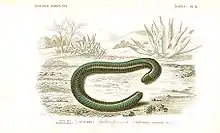Siphonopidae
The Siphonopidae are the family of common caecilians. They are found in Central and South America. Like other caecilians, they superficially resemble worms or snakes.
| Siphonopidae | |
|---|---|
 | |
| Siphonops annulatus | |
| Scientific classification | |
| Kingdom: | Animalia |
| Phylum: | Chordata |
| Class: | Amphibia |
| Order: | Gymnophiona |
| Clade: | Apoda |
| Family: | Siphonopidae Bonaparte, 1850 |
| Genera | |
|
Brasilotyphlus | |
They are the sister group to Dermophiidae, also of South America. Siphonopids are oviparous caecilians, meaning they lay eggs. They have imperforated stapes and no inner mandibular teeth. Like species of some other caecilian families, their skulls have relatively few bones, with those present being fused to form a solid ram to aid in burrowing through the soil. The mouth is recessed beneath the snout, and there is no tail.[1]
Genera and species
- Genus Brasilotyphlus
- Genus Luetkenotyphlus
- Luetkenotyphlus brasiliensis
- Luetkenotyphlus fredi
- Luetkenotyphlus insulanus
- Genus Microcaecilia
- Microcaecilia albiceps
- Microcaecilia butantan
- Microcaecilia dermatophaga[2]
- Microcaecilia grandis
- Microcaecilia iwokramae
- Microcaecilia iyob
- Microcaecilia marvaleewakeae
- Microcaecilia nicefori
- Microcaecilia pricei
- Microcaecilia rabei
- Microcaecilia rochai
- Microcaecilia savagei
- Microcaecilia supernumeraria
- Microcaecilia taylori
- Microcaecilia trombetas
- Microcaecilia unicolor
- Genus Mimosiphonops
- Genus Siphonops
References
- Nussbaum, Ronald A. (1998). Cogger, H.G.; Zweifel, R.G. (eds.). Encyclopedia of Reptiles and Amphibians. San Diego: Academic Press. p. 57. ISBN 0-12-178560-2.
- Wilkinson; Sherratt; Starace & Gower (2013). "A New Species of Skin-Feeding Caecilian and the First Report of Reproductive Mode in Microcaecilia (Amphibia: Gymnophiona: Siphonopidae)". PLOS ONE. 8 (3): e57756. doi:10.1371/journal.pone.0057756. PMC 3590283. PMID 23483926.
- Nussbaum, Ronald A.; Mark Wilkinson (1989). "On the Classification and Phylogeny of Caecilians". Herpetological Monographs (3): 1–42. doi:10.2307/1466984.
- Frost, Darrel R. (2019). "Siphonopidae". Amphibian Species of the World: an Online Reference. Version 6.0. American Museum of Natural History, New York, USA. Retrieved 8 October 2019.
- AmphibiaWeb: Information on amphibian biology and conservation. [web application]. 2004. Berkeley, California: AmphibiaWeb. Available: http://amphibiaweb.org/. Retrieved 26 August 2004
This article is issued from Wikipedia. The text is licensed under Creative Commons - Attribution - Sharealike. Additional terms may apply for the media files.